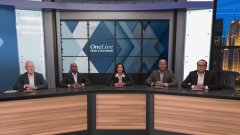
Ribociclib/ET versus Chemotherapy in Premenopausal Patients: RIGHT Choice
Timothy Pluard, MD, discusses recent data from an age-based subgroup analysis of RIGHT Choice, which compares the efficacy of combination ribociclib/ET versus chemotherapy in the first-line treatment of HR+/HER2- advanced breast cancer.
Episodes in this series

Transcript:
Komal Jhaveri, MD, FACP: One of the burning questions that we always have in the first line is [about] our young premenopausal women, and [how] they have aggressive tumor biology and don’t necessarily have the same outcomes that we would expect for others. Should we offer them chemotherapy? Can you walk us through the evidence about what you do [with] your patients and why?
Timothy Pluard, MD: That’s been an ongoing debate about somebody who has visceral involvement. Do they need [first-line] chemotherapy?… There’s no absolute definition of what’s visceral crisis or impending visceral crisis. There are some guidelines from the ABC [Advance Breast Cancer Global Alliance], but it’s really in the eyes of the treating physician as to what’s visceral crisis. Generally, you can say it’s impending organ failure, whether that’s hepatic failure or whether it’s respiratory failure from lung involvement.
So, the RIGHT Choice trial looked at the question of whether chemotherapy or ribociclib and endocrine therapy would be better in the first-line setting in patients with very aggressive visceral-involvement disease. The outcome of the trial showed that ribociclib and endocrine therapy had about a 12-month-longer progression-free survival. They both had the same overall response rate. So it’s clear that the combination of ribociclib and endocrine therapy is probably more effective than chemotherapy in those patients. It’s hard to envision the population that really needs chemotherapy in the first-line setting. Even the young patients, when they [were] analyzed and presented at ASCO [American Society of Clinical Oncology annual meeting] 2023, the patients under 40 compared to the overall population, they derived a similar benefit. So even in that population where we think the cancer is extremely aggressive, the ribociclib and endocrine therapy was still more effective.
Komal Jhaveri, MD, FACP: Yes, and the toxicity profile seems to be favoring the endocrine therapy arm as well with a CDK4/6 inhibitor. At some point I think patients are not going to be able to tolerate continuous chemotherapy, but I think they were able to tolerate the endocrine therapy. So yes, such an important question to be addressed for our patients there.
Transcript edited for clarity.
Clinicians referring a patient to MSK can do so by visiting msk.org/refer, emailing referapatient@mskcc.org, or by calling 833-315-2722.





































